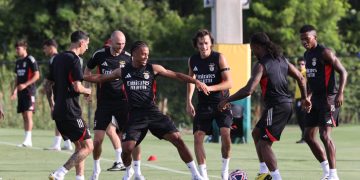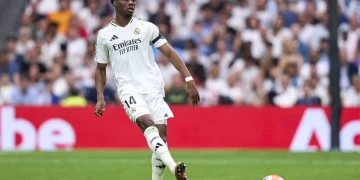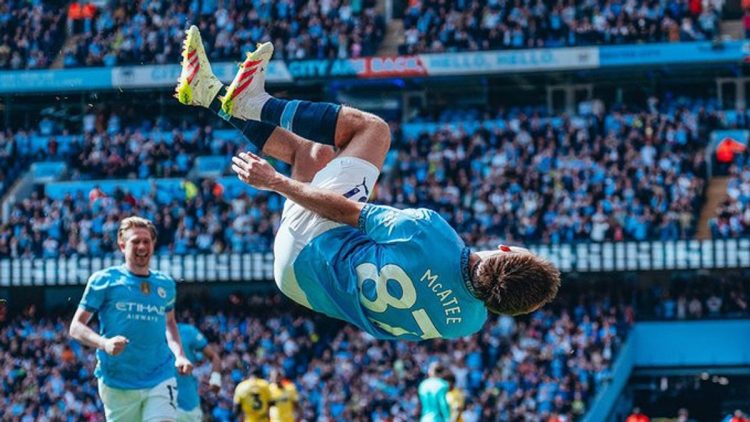Introduction
Manchester City has firmly established itself as one of the most dominant forces in European football over the last decade. Under the management of Pep Guardiola, the club has won multiple Premier League titles, FA Cups, and Carabao Cups, cementing their place among the elite teams in Europe. However, despite their domestic dominance, City’s pursuit of the coveted UEFA Champions League trophy has proven elusive. The iconic competition, often referred to as the Holy Grail of club football, has been a constant source of frustration for Guardiola’s City, with the team repeatedly falling short in key moments.
The question on everyone’s mind heading into the new season is whether Manchester City’s Champions League dream can finally be realized. After a historic 2022-2023 season, where City clinched the Premier League, FA Cup, and Champions League — completing an extraordinary treble — the narrative has shifted. The club is no longer looking to break their Champions League curse; instead, they are looking to defend their crown. But as defending champions, how can they continue to evolve and stay ahead of the pack?
One key factor in City’s pursuit of further European glory will be Pep Guardiola’s tactics. Guardiola’s tactical evolution has been the bedrock of City’s success, but will his new approach in the Champions League break the “curse” of falling short in the knockout stages? This article will delve into Manchester City’s journey to their first-ever Champions League title, analyze Guardiola’s evolving tactical philosophies, and explore whether City can continue their Champions League dominance in the upcoming seasons.
Section 1: The Champions League “Curse” – A Frustrating Journey
1.1 Guardiola’s Pursuit of European Glory
Pep Guardiola’s tenure at Manchester City has been nothing short of extraordinary. Since taking over in 2016, Guardiola has led City to four Premier League titles, multiple domestic cups, and established the club as a dominating force in England. However, despite this success, Guardiola’s record in the Champions League has been seen as one of his few blemishes. His teams, whether at Barcelona, Bayern Munich, or Manchester City, have often underperformed in key knockout ties.
- Close Calls: Guardiola’s Manchester City has reached the Champions League semifinals multiple times, but they have often stumbled at the final hurdle, either in the quarterfinals or semifinals. The most painful of these came in the 2020-2021 season, when City were beaten by Chelsea in the final, despite being strong favorites. That loss only deepened the narrative that Guardiola, despite his tactical brilliance, couldn’t bring the Champions League to City.
- The 2022-2023 Season – The Breakthrough: Finally, after years of disappointment, City and Guardiola achieved the ultimate prize in European football, winning the 2022-2023 UEFA Champions League by defeating Inter Milan 1-0 in the final. This victory was a significant turning point for Guardiola, City, and their supporters. It was the culmination of years of perseverance, tactical evolution, and hard work. But was this a one-time achievement, or can City continue to dominate in Europe?
Section 2: Guardiola’s Tactical Evolution – How He Plans to Break the Champions League Bottleneck
2.1 From Possession Football to Flexibility
Pep Guardiola is renowned for his possession-based style of football, which emphasizes maintaining control of the game through passing, building attacks from the back, and relentless pressing without the ball. At Barcelona, he revolutionized the game with tiki-taka, while at Bayern Munich, he expanded his tactics to incorporate more pressing and fluid positioning.
With Manchester City, Guardiola’s tactics have been adapted to the Premier League’s faster pace and more physical nature. His system has evolved over time, especially in the Champions League, where European teams tend to play with more tactical discipline and focus on counter-attacking.
- Tactical Flexibility: One of Guardiola’s most important tactical developments at City has been the ability to adapt his strategy based on the opponent. In the 2022-2023 Champions League, Guardiola moved away from his traditional 4-3-3 and 4-1-4-1 formations to adopt a more fluid, positional system. His use of “inverted full-backs” (such as Joao Cancelo or Kyle Walker) and Rodri as a deep-lying playmaker provided control in midfield while maintaining attacking options.
- Aggressive Pressing: Guardiola’s system also revolves around pressing high up the pitch to win the ball back quickly. In the Champions League final against Inter Milan, City’s pressing game disrupted Inter’s ability to build attacks and forced mistakes, allowing City to control possession. This high-pressing approach, combined with fluid attacking movements, helped City break down their opponents in crucial knockout games.
2.2 Tactical Adaptations in the Champions League
Guardiola’s adaptation to the nuances of the Champions League has been a critical factor in their eventual success. While his domestic approach focuses heavily on positional dominance and width, his European game has become more compact, allowing his team to absorb pressure and then explode on the counter. The use of wide players like Jack Grealish and Phil Foden, combined with Erling Haaland’s physical presence in the middle, provided City with a balanced attack that could shift from possession to direct play when necessary.
- Defensive Solidity: One criticism of Guardiola’s style, particularly in the Champions League, has been the vulnerability of his defense in crucial knockout ties. However, in the 2022-2023 season, City’s defense was significantly strengthened, particularly with Ruben Dias forming a rock-solid partnership with John Stones. The inclusion of Rodri as a central pivot also gave City the added defensive stability required to play a more solid, counter-balanced style.
- Haaland’s Impact: The signing of Erling Haaland has been one of Guardiola’s most crucial moves. Haaland’s pace, strength, and clinical finishing have given City a more direct option in attack, which was previously missing in Guardiola’s system. Haaland’s ability to convert chances quickly has allowed City to transition from their traditional tiki-taka style to more direct, quick counter-attacks, a significant weapon in the Champions League against high-quality European sides.
2.3 Guardiola’s Tactical Masterclass in the 2022-2023 Champions League Final
Guardiola’s tactical brilliance in the 2022-2023 Champions League final was on full display. Although the game against Inter Milan was tense and closely contested, Guardiola’s strategic decisions played a crucial role in securing the win.
- Positioning of Players: Guardiola used Kevin De Bruyne as a key figure in breaking down Inter’s defensive block. His vision and passing range allowed City to unlock the defense when needed. Additionally, the inverted full-back role used by Ruben Dias and Kyle Walker added an additional layer of control in midfield.
- Control of the Midfield: With Rodri controlling the tempo in midfield, City managed to limit Inter’s counter-attacks and retained possession. This helped them to dictate the match, with City’s ability to press high forcing Inter into difficult situations.
- Strategic Substitutions: Guardiola’s decision to bring on Phil Foden and Bernardo Silva during the final proved crucial, as both players added fresh legs and creativity, allowing City to control the ball and wear down Inter’s defense.

Section 3: The Future – Can City Continue to Dominate in Europe?
3.1 The Road Ahead for Manchester City
The question remains: Can Manchester City’s dominance in Europe continue? The 2023-2024 season presents both opportunities and challenges. On one hand, City enters the new season as the defending Champions League holders, and with their current squad, they are favorites to retain the title. However, with the strength of competition in the Champions League, City will need to stay focused and maintain the level of consistency that helped them achieve their treble.
- Defending the Title: Historically, defending the Champions League has been a difficult task for many top clubs. However, with a squad brimming with talent and depth, Guardiola’s tactical evolution could be the key to overcoming any challenges. With Haaland in form, alongside established players like De Bruyne, Gundogan, and Ederson, City has the experience and quality to be serious contenders once again.
- Competition from European Giants: Teams like Bayern Munich, Paris Saint-Germain, and Real Madrid will all pose significant threats. While Real Madrid, with their wealth of experience, remain a formidable force in Europe, Guardiola’s tactical adjustments over the years have positioned City to overcome such challenges. The increasing depth of City’s squad, especially with the signings of players like Kalvin Phillips and Sergio Gomez, will allow Guardiola to rotate effectively and manage the demands of both domestic and European football.
3.2 Guardiola’s Legacy – Beyond the Champions League
While the Champions League trophy has long been Guardiola’s ultimate goal, his impact on Manchester City and European football cannot be understated. Guardiola’s tactical innovations, especially with the use of inverted full-backs, false nines, and pressing systems, have changed how the modern game is played.
Even if Guardiola were to retire tomorrow, his legacy as one of the greatest managers of all time, particularly in the context of Manchester City, would be secure. Whether or not City continues to dominate Europe, Guardiola’s influence on the club and the sport as a whole will continue to be felt for years to come.
Conclusion: A New Chapter for Manchester City
After a historic treble and breaking their long-standing Champions League curse in 2023, Manchester City is poised to continue their pursuit of European glory. With Pep Guardiola at the helm, the tactical evolution of the team has allowed City to thrive at the highest level, blending possession-based football with flexibility and intensity.
However, repeating their success in the 2023-2024 season will not be easy. City faces fierce competition from across Europe, and the pressure of defending their Champions League title is immense. But with a squad packed with talent and the tactical genius of Guardiola leading the way, Manchester City’s dream of continued Champions League success looks more attainable than ever before.
The real test for City will be whether they can evolve and stay ahead of the competition while maintaining the intensity and consistency needed to defend their crown. If Guardiola’s tactical innovations continue to deliver, Manchester City could well be on their way to establishing themselves as Europe’s dominant force for years to come.






























Discussion about this post